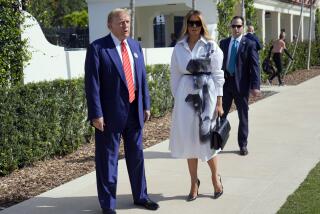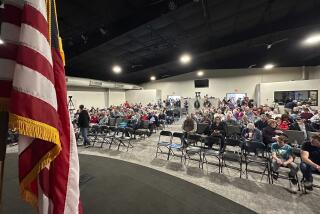Explaining the Democrats’ two-state delegate debacle
 Straight to your inbox
Straight to your inboxClick here to subscribe to the Los Angeles Times' free daily e-mail newsletter on national politics.
Democrats are wrestling with the issue of how to deal with Florida and Michigan voters, a large speed bump on the road to the presidential nomination. Here are the major points of the dispute.
How did the problem arise?
The Democratic National Committee warned Florida and Michigan that they would be punished if they moved their presidential primaries from March to January. The states thought that having earlier elections would give them a greater role in picking the presidential candidates so they went ahead and moved the primaries anyway.
What did the national political parties do?
The national Democratic and Republican parties punished the states by stripping them of delegates. The Republicans sharply cut the number of delegates at stake while the Democrats stripped away all of the pledged delegates, 210 in Florida and 156 in Michigan.
Were the primaries held?
Yes. Michigan voted on Jan. 15 and Florida on Jan. 29.
What was the Republican outcome?
Former Massachusetts Gov. Mitt Romney won Michigan, giving his campaign a small boost since he was a native son. Arizona Sen. John McCain won Florida after he was endorsed by the popular governor, Charlie Crist. The victory helped McCain build momentum and he is now the presumptive GOP nominee.
What was the Democratic outcome?
Even though Democratic candidates agreed not to campaign, there were results. New York Sen. Hillary Rodham Clinton won more than 55% of the vote in Michigan, though Illinois Sen. Barack Obama’s name didn’t appear on the ballot. In Florida, Clinton won with more than 50% of the vote to Obama’s 33%. Neither result counted in the awarding of delegates.
If everyone knew the results wouldn’t count, why is there a dispute?
There are two reasons, both political. The first involves arithmetic.
Obama is more than 100 delegate votes ahead of Clinton, according to the Associated Press, though there are other counts with different numbers. With fewer than a dozen contests remaining, it is unclear if Clinton can catch Obama since they have been running neck-and-neck and delegates are awarded on a proportional basis. Strong showings in Florida and Michigan would help Clinton close the gap.
The second reason is that the Democratic nominee will need to win in Michigan and especially in Florida in November. Preventing the states from having a role in picking the nominee could hurt in the general election.
So what happens now?
Politicians in both states have tried to develop plans that would allow there to be delegations at the Democratic national convention at the end of August in Denver. Among the ideas were holding new primaries, some form of mail-in primary or possibly, caucuses to award delegates.
Where do the plans stand?
In Florida, Democrats have abandoned their effort for a mail-in vote, making it unlikely that another primary can be organized.
In Michigan, the possibility of another primary looks increasingly less likely since local politicians can’t agree. The Michigan legislature is planning to recess this week for the Easter holiday, so it needs to move quickly.
What are the political problems?
Ultimately, the issue is how the awarding of Democratic delegates from the two states will shape the presidential nominating process. That means that the two campaigns must reach a compromise, which looks increasingly unlikely as the candidates fight furiously for each delegate.
That has determined some of the bargaining positions. For example, the Clinton campaign pushed early for counting the January primaries, a move strongly opposed by the Obama campaign, which backed some form of caucus. That idea was opposed by Clinton since Obama has done especially well in the caucuses.
There have also been proposals to split the delegates between the contenders, allowing the states to be represented but not having an impact on the gap between the two candidates.
Clinton, in a visit to Detroit today, told a predominantly union audience that it would be “un-American” if the delegations from the two states were barred from the national convention, and her campaign blamed Obama supporters for hindering the Michigan effort for another primary.
If there is no resolution, what happens?
The final decision on who gets to attend the national convention is up to the credentials committee of the convention. Traditionally, that committee is controlled by the candidate who controls the convention.
If neither Clinton nor Obama win enough delegates in the primaries and caucuses to capture the presidential nomination, then the superdelegates, office-holders and party leaders, will decide.
What about the Democratic National Committee?
The DNC has said that a privately-financed Michigan primary would be acceptable.
Are there other problems?
There is always the question of money, specifically: who will pay for the new elections, estimated to cost millions of dollars each, depending on the final plan. The DNC chief has said the national committee won’t pay.
Can’t the money be raised?
Probably, but the underlying political questions need to be resolved first.
More to Read
Start your day right
Sign up for Essential California for news, features and recommendations from the L.A. Times and beyond in your inbox six days a week.
You may occasionally receive promotional content from the Los Angeles Times.







